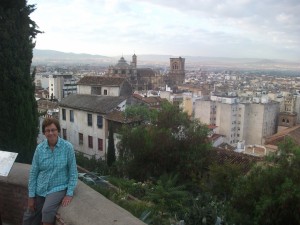Does the name Calgary mean clear running water or cabbage patch? For sure, both would be useful in pioneer days.
All posts by admin
Exodus – Part One
My first creative writing courses, taken through Concordia University Continuing Education in 1992, required students to submit final assignments. For Introductory Creative Writing, this was a portfolio of poems and/or short stories up to a specified number of pages. Magazine Writing required a short story and a magazine or newspaper article, with a query letter.
During that fall term, I only came up with one complete short story, which I handed in for both courses. This felt like cheating, but I ultimately found it helpful to get comments from the two instructors. Gerry, the poet teacher of Intro, wasn’t impressed with my poems, but he liked the story. Denise, the Magazine Writing teacher, read my scene of group dialogue to the class. I later sent the story to a literary magazine and received a hand-written rejection saying the story was well-written, but they weren’t able to publish it. I was crushed and never sent the story out again. I didn’t know then that any rejection beyond a form letter was a positive.
Denise’s fiction instruction focussed on imagery. She urged us to start with an image and write the story from there. I didn’t get what she was driving at. That final story I gave her used an image of a ferris wheel, but imposed it on the story after I had the basic plot, characters and theme. Denise’s approach would have been to start with the wheel and let the story evolve from it. Despite the kind words of the literary magazine, my story probably wasn’t very good. 
Denise also advised us to write in the first person to practice getting into the narrator’s head, a writing concept I wasn’t aware of before taking the course. I was used to stories in distant third person. Once upon a time in a land far away … After a few assignments where I tried first person, I grasped what she meant and was soon able to transfer that skill to third person.
Today, when teaching courses, I sometimes feel like a point-of-view Nazi, harping on students to stay with a third person narrator and get deeper into his or her thinking and speech patterns, rather than shift all over, so readers will engage with the POV character.

What Not to Miss … For Mystery Fans
Word on the Street
I’m looking forward to Word on the Street on Sunday, September 20th, in Lethbridge, AB. I’ll be at the Crime Writers of Canada table and participating in two events.
At 1:00 PM, I emcee Grab a Coffee with Killer Some Writers, featuring readings and conversations with mystery authors David A. Poulsen, Garry Ryan and Sharon Wildwind. At 2:00 PM, at It’s Not CSI: A police sergeant and mystery writer’s perspectives, Police Sergeant Robin Klassen and I discuss how a mystery writer approaches writing about crime and police work, what the day to day life of a police officer is like and how fact and fiction differ.
When I’m not at presenting or at the CWC table, I’ll be checking out the festival’s featured guests: Kelley Armstrong, author of numerous fantasy and paranormal books, Maureen Jennings, author of the popular Murdoch Mysteries series and Sharon Johnston, wife of our Governor General, who will recount the struggles of veterans adjusting to life in Canada after WWI.
Let’s hope for warm, sunny weather and a fabulous turnout at this sixth year of the Lethbridge festival.
The Danger of Being Different
For some beautiful music and writing, check out Shaun Hunter’s post about author/songwriter Rae Spoon. Calgary has its strengths, but it might not be the easiest place for those who are ‘different.’
Genesis
Twenty-four years ago I decided to become a writer. In particular, I wanted to write a novel and had an idea for a semi-autobiographical story based on the experience that had inspired my desire to write. Around this time, my family bought its first computer. The way to write a book, I presumed, was to sit down and type.
I wrote the opening scene, and since I more-or-less knew how the story would evolve, I abandoned a linear approach in favour of writing later key scenes that were grabbing me now. I must have looked at a writing advice book or two because I recall reading that semi-autobiographical fiction rarely works. My book would be the exception, I felt, like Little Women by Louisa May Alcott, one of my favourite authors when I was a child.
While I enjoyed writing my dramatic scenes and even cried while composing one, I soon realized that I knew nothing about writing. I hadn’t written a fictional story since high school. A year after starting the book, I registered for two continuing education courses at Concordia University in Montreal, where I lived at the time. For convenience, I chose ones that were back-to-back on the same night: Magazine Writing taught by Denise Roig and Introductory Creative Writing by poet Gerry Shikatani.
Gerry, I was recently pleased to learn, is, among other things, the founding director of Lorca’s Granada: writers’ retreat & colloquia in Granada, Spain, a city I visited last year and am thinking of using as a story setting. Denise has published two critically acclaimed short story collections. My writing instruction began in good hands.

A few classes in, I had my first revelation: my novel-in-progress was crap. Semi-autobiographical fiction didn’t work, at least it didn’t for me. The facts — what really happened — were preventing my imagination from taking flight and I was also holding back on portraying my psedo-real characters with all their conflicts and warts. Non-fiction had the compensating benefits of being true, while semi-autobiographical fiction seemed to combine the weaknesses of fiction and non-fiction. In addition, my instructors were steering me in the direction of writing shorter pieces, which was good for learning. I abandoned my novel-in-progress and went with the flow of the courses.
Clear air
The smoke that has blanketed Calgary for the past five days makes me long for the “glass air” and “limitless grassland wrapped in light as clear as cellophane” that poet P.K. Page loved about Calgary when she lived here in the 1920s.
WWC postcript
Last weekend’s When Words Collide writers and readers conference was a blast. I took in activities for three days, but managed to pace myself so that I didn’t feel exhausted at the end. I sat on two panels, read from my short story in the crime writing anthology, AB Negative, stayed up past my bedtime for two parties and attended numerous sessions where I picked up tips and insights into writing and publishing. I’ve already registered for next year – only $45 if you sign up by December.
The Calgary Tower
I can relate to author Robert Kroetsch’s meditation on the Husky Tower, even though the now-named Calgary Tower no longer towers above the surrounding buildings. Over the years, I’ve enjoyed many trips to the upper floor for views of the mountains and Calgary spread below. A few times, when relatives visited for the Christmas holidays, we’ve had breakfast in the revolving restaurant. Being December in Calgary, we didn’t even have to get up early to catch the sunrise.
Alberta Humour
When our book club was recalling the books we’d discussed in recent years, someone asked if there was a type of story that was missing from our selections. One person answered “humour.” Barb Howard’s Whipstock is a rarity – a funny Canadian novel, with depth. It deals with the oil patch and feminism, another unlikely pairing.